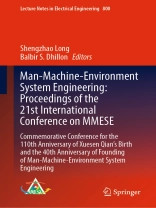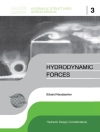Man-Machine-Environment System Engineering: Proceedings of the 21st Conference on MMESE is the academic showcase of best research papers selected from more than 500 submissions each year. From this book reader will learn the best research topics and the latest development trend in MMESE design theory and other human-centered system application.
MMESE focus mainly on the relationship between Man, Machine and Environment. It studies the optimum combination of man-machine-environment systems. In the system, the Man means the working people as the subject in the workplace (e.g. operator, decision-maker); the Machine means the general name of any object controlled by the Man (including tool, Machinery, Computer, system and technology), the Environment means the specially working conditions under which Man and Machine occupy together(e.g. temperature, noise, vibration, hazardous gases etc.). The three goals of the optimization of the system are safety, efficiency and economy.
In 1981 with direct support from one of the greatest modern Chinese scientists, Qian Xuesen, Man-Machine-Environment System Engineering (MMESE), the integrated and advanced science research topic was established in China by Professor Shengzhao Long. In the letter to Shengzhao Long, in October 22nd, 1993, Qian Xuesen wrote: “You have created a very important modern science subject and technology in China!”.
Tabla de materias
Research on the Man Character.- Research on the Machine Character.- Research on the Environment Character.- Research on the Man-Machine Relationship.- Research on the Man-Environment Relationship.- Research on the Machine-Environment Relationship.- Research on the Overall Performance of Man-Machine-Environment System.- Theory & Application Research of the MMESE.
Sobre el autor
Professor Shengzhao Long
Professor Shengzhao Long is the founder of the Man-Machine-Environment System Engineering (MMESE),the Chairman of the Man-Machine-Environment System Engineering (MMESE) Committee of China, the Chairman of the Beijing Kecui Man-Machine Environment System Engineering Technology Research Institute and the Former Director of Ergonomics Lab of Astronaut Centre of China. In October 1992, he’s honored by the Chinese Government National Specific Allowance.
Professor Shengzhao Long graduated from the Shanghai Science and Technology University in 1965, China. In 1981, supported by the famous modern scientist Qian Xuesen, he founded MMESE theory.
In 1982, he proposed and developed Human Fuzzy Control Model using fuzzy mathematics. From August 1986 to August 1987, he conducted research in Man-Machine System as a visiting scholar at Tufts University, Massachusetts, U.S.A. In 1993, he established Man-Machine-Environment System Engineering (MMESE) Committee of China. He published “Foundation of theory and application of Man-Machine-Environment System Engineering”(2004) and “Man-Machine-Environment System Engineering”(1987). He’s the chief editor from the 1st to the 20th conference proceeding on Man-Machine-Environment System Engineering from 1993 to 2020.
Professor Balbir S. Dhillon
Professor Dhillon is a professor of Engineering Management in the Department of Mechanical Engineering at the University of Ottawa, Canada. He has served as a Chairman/Director of Mechanical Engineering Department/Engineering Management Program for over 10 years at the same institution. He has published over 345 (i.e., 201 journal + 144 conference proceedings) articles on reliability, safety, engineering management, etc. He has been on the editorial boards of 9 international scientific journals. In addition, Dr. Dhillon has written 34 books on various aspects of reliability, design, safety, quality, and engineering management published by Wiley (1981), Van Nostrand (1982), Butterworth (1983), Marcel Dekker (1984), Pergamon (1986), etc. His books are being used in over 85 countries and many of them are translated into languages such as German, Russian and Chinese. He has served as General Chairman of two international conferences on reliability and quality control held in Los Angeles and Paris in 1987.
Professor Dhillon has served as a consultant to various organizations and bodies and has many years of experience in the industrial sector. At the University of Ottawa, he has been teaching reliability, quality, engineering management, design, and related areas for over 29 years and he has also lectured in over 50 countries, including keynote addresses at various international scientific conferences held in North America, Europe, Asia, and Africa. In March 2004, Dr. Dhillon was a distinguished speaker at the Conf./Workshop on Surgical Errors (sponsored by White House Health and Safety Committee and Pentagon), held at the Capitol Hill (One Constitution Avenue, Washington, D.C.).
Professor Dhillon attended the University of Wales where he received a BS in electrical and electronic engineering and an MS in mechanical engineering. He received a Ph.D. in industrial engineering from the University of Windsor.












